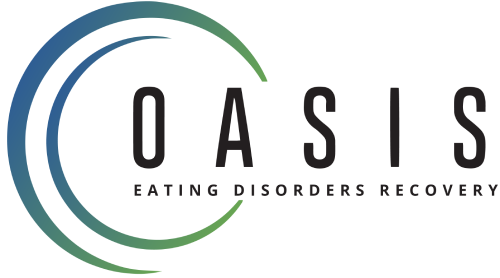At Oasis Eating Recovery, we understand that not every eating disorder fits neatly into a single category—and that’s exactly why we specialize in treating OSFED, or Other Specified Feeding or Eating Disorder. OSFED is one of the most common types of eating disorders, yet it’s often misunderstood or overlooked.
We recognize that OSFED can be just as disruptive, painful, and isolating as any other eating disorder. That’s why our approach is rooted in compassion and customization. Whether you’re facing irregular eating habits, obsessive food-related thoughts, or distress about body image that doesn’t fit a textbook definition, we’re here to help. Our team of specialists provides personalized care plans that are grounded in evidence-based therapies and focused on long-term healing—not just symptom management.
OSFED, or Other Specified Feeding or Eating Disorder, is a clinical diagnosis for individuals who experience disordered eating patterns that don’t fully align with the criteria for anorexia, bulimia, binge eating disorder, or ARFID. Despite being sometimes misunderstood as “not serious enough,” OSFED is a legitimate and often deeply distressing condition. It can include behaviors like restrictive eating without being underweight, occasional binge-purge cycles, or significant body image concerns that don’t fit neatly into other diagnoses.
Importantly, research has shown that individuals with OSFED experience comparable levels of eating disorder and general psychological distress as those diagnosed with full-threshold eating disorders. In other words, OSFED is not a milder form—it carries the same emotional pain, health risks, and disruption to daily life. At Oasis Eating Recovery, we take OSFED just as seriously, offering the same level of care, support, and evidence-based treatment as we do for any other eating disorder.
Most cases of OSFED fall under the umbrella of disordered eating, but it’s important to remember that both disordered eating and diagnosed eating disorders deserve to be taken seriously. The emotional and physical risks are real in either case, which is why compassionate, professional care is so important. [Read more about disordered eating vs. eating disorders in our blog].
OSFED isn’t one-size-fits-all. It’s a broad category that includes several specific subtypes—each with its own patterns, struggles, and challenges. Below are some of the most commonly recognized forms of OSFED:
Individuals experience all the psychological and behavioral symptoms of anorexia—like food restriction, fear of weight gain, and body image distress—but remain within or above a “normal” weight range. The emotional toll is just as intense, even if it doesn’t show up on the scale.
This subtype involves binge eating and compensatory behaviors (like purging or excessive exercise), but not as often or for as long as required for a formal bulimia diagnosis. Still, the cycle can be emotionally exhausting and physically harmful.
Similar to full-threshold binge eating disorder, but episodes happen less frequently or for a shorter period of time. These individuals still struggle with feelings of guilt, shame, and loss of control around food.
Purging behaviors like vomiting, laxative misuse, or excessive exercise occur without the presence of binge eating. This can be especially dangerous to the body, even when food intake appears “normal.”
Characterized by repeated episodes of night-time eating, either after waking up or by excessive intake after the evening meal. It’s often linked with disrupted sleep and emotional distress. Read more about how we treat Night Eating Syndrome.

We know that asking for help takes courage. Getting in touch is the first step. We’re here for you, no matter what. Once submitted, our admissions team will be in touch within 24 hours.
Or call us directly to get started: (559) 245-6203
Connect with our admissions team over the phone for a confidential conversation to understand your needs and goals.
Together, we’ll determine the level of care that best supports your recovery journey.
We create a comprehensive treatment plan to ensure continued healing and support with group therapy, nutrition, body image groups, individual/family sessions.

Yes—OSFED is just as serious as anorexia, bulimia, or binge eating disorder. Studies have shown that people with OSFED experience similar levels of psychological distress, physical health risks, and functional impairment. The symptoms may look different, but the emotional and physical toll can be just as significant.
If you’re struggling with eating behaviors that feel distressing, disruptive, or compulsive—but don’t fit the “classic” signs of another eating disorder—you may be dealing with OSFED. The best way to know for sure is through a professional diagnostic assessment, which we offer as the first step in treatment at Oasis Eating Recovery.
OSFED includes symptoms that don’t meet the full diagnostic criteria for disorders like anorexia or bulimia, but are still very real and harmful. For example, you might restrict food but not be underweight, or binge and purge occasionally rather than frequently. The difference is in the technical criteria, not the seriousness or the need for treatment.
Treatment is personalized and may include individual therapy, group therapy, nutritional counseling, and psychiatric support. At Oasis, we tailor every care plan based on your specific needs, and we offer treatment across several levels of care—including partial hospitalization (PHP), intensive outpatient (IOP), and outpatient therapy.
While specific long-term studies on OSFED recovery are limited, research on related eating disorders like anorexia and bulimia shows that full recovery is possible. Many individuals with these conditions go on to live healthy, fulfilling lives—and we believe the same is true for those with OSFED. Motivation plays a major role in that process. When someone is committed to change and has the right support, the path to recovery becomes much more achievable. At Oasis Eating Recovery, we focus on helping you build the tools, insight, and resilience needed to define what recovery looks like for you.

I will be back soon